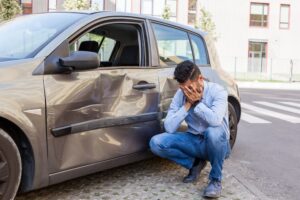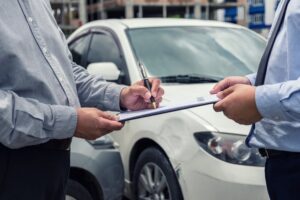Did You Get Doored? Here’s Why it is Not Your Fault!
Did You Get Doored? Here’s Why it is Not Your Fault!
Unfortunately, motorcycle and bicycle riders are susceptible to dooring accidents – especially in close quarters. A dooring accident happens when a motor vehicle driver or passenger opens their door into the path of an oncoming cyclist. These drivers and passengers have a duty to look out for cyclists and pedestrians in the vicinity and to wait until they pass. If they negligently open their door in the cyclist’s direct path, the cyclist may fall off their bicycle or motorcycle, strike the ground forcefully, and suffer serious injuries.
If you recently sustained injuries in a dooring accident that a negligent motorist or passenger caused, you may have legal options that you can consider. An experienced motor vehicle accident attorney can carefully review your circumstances with you and pursue a claim with the responsible party’s insurance company.
Schedule a Free Initial Consultation
What are the Most Common Injuries in a Dooring Accident?

Dooring accidents can lead to a variety of physical and mental injuries for those involved. Physically, one of the most common injuries is traumatic injuries to the lower extremities. When a cyclist collides with an open car door, the impact can cause fractures, sprains, and severe muscular contusions to the legs, knees, and ankles. In some cases, the force may even lead to more significant injuries like dislocations or fractures.
Head injuries are another prevalent consequence of dooring accidents. Cyclists, in particular, are vulnerable to head trauma if they fall off their bikes upon collision with an open door. Even with helmets, the collision may result in concussions or more severe traumatic brain injuries, posing long-term health risks.
In addition to physical injuries, mental distress is a common aftermath of dooring accidents. Anxiety and post-traumatic stress disorder (PTSD) can develop, especially among cyclists, who may develop a heightened fear of cycling near parked cars or experiencing a similar incident again. The sudden and unexpected nature of dooring accidents can leave lasting emotional scars on victims.
Spinal injuries are also a concern, as the force of a collision can lead to back injuries or exacerbate existing spinal conditions. These injuries may result in chronic back pain, limited mobility, and a substantial effect on the overall quality of the accident victim’s life.
Soft tissue injuries, such as whiplash, are also prevalent in cyclists involved in dooring accidents. The abrupt stop or swerve to avoid the open door can cause rapid and forceful neck movements, resulting in severe muscular strains and sprains.
The financial burden of medical expenses and potential loss of income due to physical injuries can also contribute to mental stress and emotional strain on dooring accident victims. The complex interplay of physical and mental injuries underscores the importance of comprehensive medical assessments, ongoing mental health support, and legal recourse for those affected by dooring accidents. Seeking compensation for these injuries involves addressing immediate medical needs and long-term consequences, ensuring that accident victims receive adequate support and compensation for their physical and mental well-being.
Where Can a Dooring Accident Happen?
Bicycle and motorcycle dooring accidents are more likely to occur in urban environments, particularly in areas with dense populations and high traffic. One common scenario is in city centers, where parallel parking is prevalent along busy streets. Cyclists and motorcyclists navigating through these areas risk colliding with open car doors as occupants exit their parked vehicles.
Bike lanes adjacent to parked cars are another notable hotspot for these accidents. Even in areas with designated bike lanes, the proximity of parked vehicles increases the likelihood of car doors swinging open into the path of oncoming cyclists. This scenario often occurs when drivers or passengers exit their cars without adequately checking for approaching motorcycles or bicycles.
Entertainment and recreational areas, such as theaters, restaurants, or parks, also witness more dooring accidents. In these locations, drivers may focus more on finding parking spaces or reaching their destinations quickly, potentially neglecting to check for approaching bicyclists or motorcyclists.
Commercial districts, where delivery trucks frequently stop along curbsides, create additional hazards. Motorists or passengers exiting these trucks may not be as attentive to cyclists or motorcyclists approaching from behind, leading to increased chances of dooring accidents.
Residential neighborhoods with on-street parking also pose a significant risk for dooring accidents. Cyclists and motorcyclists sharing the road with parked cars may encounter doors opening unexpectedly, especially when drivers and passengers are less cautious about checking for oncoming traffic.
Traffic intersections, where vehicles frequently come to a stop, can also be danger zones for bicyclists and motorcyclists. As cars wait at traffic signals or stop signs, occupants may be inclined to open their doors without fully assessing their surroundings, putting vulnerable road users at risk.
While dooring accidents can happen anywhere, heightened vigilance is necessary in areas where parking is common, especially near traffic intersections, commercial zones, and places of recreation. Navigating these environments requires constant awareness for cyclists and motorcyclists to anticipate and react to the risk of doors unexpectedly swinging open, minimizing the potential for accidents and promoting safer coexistence on the road.
Legal Duty of Care in a Dooring Accident
In a dooring accident, the legal duty of care rests with the person opening the vehicle door. This responsibility extends to both the driver and the passengers. The duty of care mandates that individuals exercise reasonable caution before opening a car door into the path of oncoming traffic, including bicyclists and motorcyclists.
Proving negligence in a dooring accident involves demonstrating that the person opening the door failed to fulfill their duty of care, resulting in harm to another party. One crucial element is establishing that the person did not exercise the reasonable care expected in such situations.
Eyewitness accounts play a significant role in proving negligence. Testimony from individuals who observed the accident can provide insight into the actions of the person opening the door. Witnesses may attest to whether the individual checked for oncoming traffic, used mirrors, or opened the door abruptly without regard for others on the road.
Photographic evidence can also be a compelling tool in proving negligence in these cases. Clear and detailed photos of the accident scene, vehicle positions, and any visible damage can help reconstruct the events leading to the collision. Photographs may capture the angle at which the door was opened and the proximity of the cyclist or motorcyclist, contributing to the overall understanding of the incident.
Video footage, if available, is another important source of evidence in dooring cases. Surveillance cameras or dashcams may capture the moment leading up to the dooring accident, providing a visual record of the actions that the person opening the door took – and the subsequent collision.
Police reports, if filed, can also offer an official account of the accident. These reports often include statements from involved parties, witnesses, and the attending officer’s assessment of the situation. A thorough examination of the police report can reveal whether negligence substantially contributed to the accident.
Medical records documenting injuries sustained in the dooring accident are also crucial in establishing the consequences of the negligence. These records provide a clear link between the actions of the person opening the door and the resulting harm that the bicyclist or motorcyclist suffered.
Proving negligence in a dooring accident involves presenting a comprehensive case demonstrating a failure to uphold the duty of care. Eyewitness accounts, photographic and video evidence, police reports, and medical records collectively build a strong argument for establishing negligence and pursuing compensation for the damages incurred in the accident.
What if the Insurance Company Won’t Pay?
If the insurance company refuses to pay for your injuries following a dooring accident, you have legal options to pursue fair compensation. One primary avenue is to consider filing a personal injury lawsuit against the at-fault party, which may include the driver or passenger responsible for the dooring incident.
Initiating legal action involves consulting with a personal injury attorney who handles traffic accidents and can assess the merits of your case. Your attorney will investigate the circumstances surrounding your dooring accident, gather evidence, and determine the strength of your claim. This may include obtaining witness statements, collecting medical records, and assessing any available video footage or photographs from the accident scene.
Your attorney may also explore alternative dispute resolution (ADR) methods, such as mediation or binding arbitration, to seek a resolution outside of court. These approaches can offer a less adversarial and more expedient means of settling the dispute.
Negotiating with the at-fault party’s legal representative or insurance company is another common step in pursuing compensation after a dooring accident. Your attorney will present a compelling case, supported by evidence, to demonstrate the liability of the individual responsible for opening the car door. If negotiations are successful, you may reach a settlement that adequately compensates you for medical expenses, lost income, pain and suffering, and other damages resulting from the dooring accident.
However, your attorney may recommend proceeding to trial if negotiations prove unsuccessful. A personal injury lawsuit involves presenting your case in court, allowing a judge or jury to determine liability and award damages. While litigation can be a more prolonged and complex process, it provides an opportunity for a fair and impartial evaluation of your claim.
In some cases, insurance companies may dispute liability for a dooring accident. If that happens, your attorney will address these challenges, building a robust case to counter such arguments and demonstrate the extent of the at-fault party’s negligence.
It’s essential to act promptly if the insurance company refuses to cooperate, as there are legal time limits, known as statutes of limitations, for filing personal injury claims and lawsuits. Seeking legal counsel early on in the process ensures that you explore all available options and increases the likelihood of a successful resolution to obtain the compensation you deserve for your injuries and related damages.
Available Damages in a Dooring Accident Claim or Lawsuit

Following a dooring accident, an insurance company may be obligated to pay various damages to the injured party. One significant category is medical expenses. This encompasses the costs associated with hospitalization, surgeries and other medical procedures, prescription medications, physical/occupational therapy, rehabilitation, and ongoing medical treatments required due to injuries from the accident. These medical expenses often extend beyond immediate care, addressing the long-term effects on the injured cyclist’s health and well-being.
Lost income and loss of earning capacity represent another substantial component of financial damages. After a dooring accident, the injured party may face temporary or permanent disability, preventing them from working and earning income. Compensation for lost income aims to address the income that the accident victim missed during their recovery period while considering potentially diminished future earnings.
Pain and suffering is a non-economic form of damages that addresses the physical and emotional distress the accident victim experienced due to the dooring accident. It accounts for the victim’s immediate pain, long-term consequences, emotional anguish, and overall reduction in the individual’s quality of life.
Loss of consortium is another type of non-economic damage that may be available in dooring accident cases. This refers to the negative effect the victim’s injuries have on relationships and companionship with family members, including the ability to be intimate. Spouses or partners may seek these damages.
Together, these financial damages constitute a comprehensive package intended to compensate the injured party for the full extent of their losses and the consequences arising from their dooring accident. Seeking fair and just compensation involves thorough documentation, legal experience, and effective negotiation or litigation.
Contact an Experienced Bicycle or Motorcycle Accident Attorney Near You Today

Greg Bentley, Car Accident Lawyer
Bicycle and motorcycle dooring accidents can lead to disabling injuries and damages for riders. If you recently suffered injuries in one of these accidents, consult an experienced personal injury lawyer as quickly as possible. Your personal injury lawyer can swiftly file the appropriate claim or lawsuit on your behalf in a timely manner, securing your right to recover the financial damages you deserve for your injuries.
Choose a law firm near you and schedule a free consultation. You can ask your questions, tell your story, and begin the journey to financial recovery.


